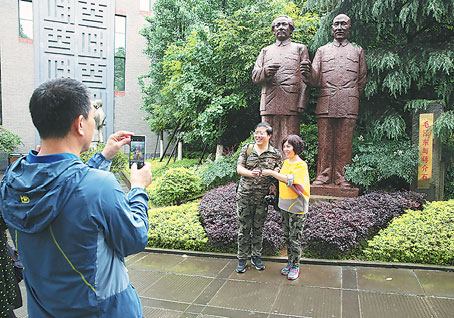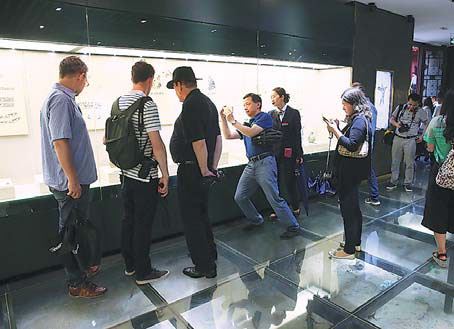Spirit of the nation takes special place in cultural life
"Liquor was invented by the wise men and the later generations followed the wise men in their ways to make liquor. People use liquor in ceremonies, drink it to prolong their lives and to make life more enjoyable."
These words from the time of the Warring States period (475-221 BC) are read by each visitor who makes his way into the Chinese Liquor Culture City in Maotai, a liquor museum set up by Kweichou Moutai. In fact, once you explore the town of Maotai, you will feel that this saying still seems to apply today. No dinner would be complete without a bottle of Moutai, the leading brand of the spirit baijiu, and the host making his way around the table to make a toast with each of his guests. This modern ritual is a way to show respect to guests, and the guests respond by accepting the drink - no matter how high the alcohol content.
Drinking alcohol is deeply rooted in Chinese culture. A drink or two will relax the senses of the people and quickly make them bond. This effect has always been used in official circles to establish friendly political and sustainable economic relations. Moutai has most often served this function. In 1945, just after the capitulation of the Japanese, even Mao Zedong and his rival Chiang Kai-shek jointly raised glasses of Moutai to celebrate their victory. A bronze sculpture erected inside the garden of the liquor museum still bears witness to this memorable event.
Moutai is also regarded as a wonderful liquor to promote peaceful international relations. The list of foreign political, cultural and economic figures that have been honored with a sip of Moutai by Chinese leaders is endless. Huge cardboard posters along the streets of Maotai depict a long line of US presidents and their Chinese counterparts raising a glass of this highly prized and, to be honest, feared liquor. When Richard Nixon and late Chinese leader Deng Xiaoping met for the first time in Beijing in 1972 to normalize Sino-US relations, one may speculate about the role that Moutai played.
The people of Maotai are proud of their liquor, which was reportedly served to Mao Zedong and his comrades on the very night of October 1, 1949, to celebrate the founding of the People's Republic of China.
Apart from the special taste and its symbolic political powers, the success story of Moutai is surely also based on the "magical function" that former premier Zhou Enlai once ascribed to it. Rumors have it that Moutai endows its consumers with eternal youth. How else to explain why 77-year-old Ji Keliang, former chairman of the Kweichow Moutai, has maintained his youthful looks after supposedly drinking as much as three tons of Moutai during his lifetime. Urban legend or not, many people are convinced that the drink has certain medical effects, and one has to admit that some people on the streets of Maotai do look younger than their actual age.
Exactly when the people of Maotai fully grasped the technology of distilling liquor is still a matter of debate. According to legend, it was during the time of the Xia Dynasty (2000-1600 BC) that Du Kang, minister of the Yellow Emperor, produced alcohol for the first time in Chinese history. Its consumption immediately became an important part of Chinese culture, especially in ancient ceremonial rites and court life.
Based on the latest research, the consumption of fermented beverages in China - possibly wine - dates back as far as 9,000 years. Evidence from the Neolithic Jiahu site in Henan province revealed vessels containing residues of an alcoholic beverage made of rice, honey and fruit.
Inscriptions on oracle bones from the late Shang Dynasty (1200-1046 BC) record that three different types of alcohol were produced during that time. Among them jiu is believed to have been a fully fermented and filtered rice or millet beverage with an alcohol content between 10 and 15 percent. During the Shang Dynasty, alcohol was used as a sacrificial offering to ancestors. In some rare cases, archaeologists were even able to bring to light the remains of actual liquors that had survived for thousands of years, and had maintained their original luster and aroma. Obviously these liquors must have been highly appreciated by the people and regarded as luxury products.
It has been widely accepted that the technology of alcohol distillation in China dates back to at least the late Yuan Dynasty (1271-1368). Its perfection was achieved during the reign of Qing emperor Kangxi, who reigned from 1661-1722. The sensational recent discovery of a distiller from the Eastern Han Dynasty (25-220) tomb of Liu He, Marquis of the Haihun State, would predate this time by nearly a thousand years.
Finds of alcohol containers from local tombs confirm that the drinking culture in and around Maotai goes back to the Shang and Zhou (1046-256 BC) dynasties. Regardless of its exact origins, I am convinced that Moutai liquor would have been the true spirit of the nation even then.
The author is a research fellow with the German Archaeological Institute.
p.wertmann@gmx.net
|
Tourists at the Chinese Liquor Culture City pose for a photo in front of statues of Mao Zedong and his rival Chiang Kai-shek raising glasses of Moutai. Photos By Jiang Dong / China Daily |
|
Foreign visitors inspect exhibits at the Chinese Liquor Culture City. |
(China Daily 07/08/2016 page6)
















